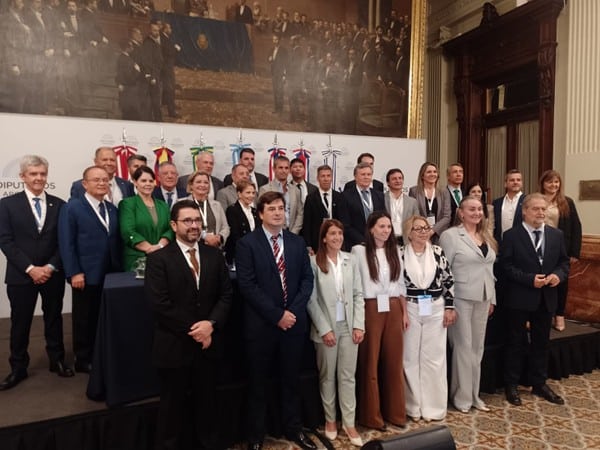
The Second AgroGlobal South American Summit took place at Argentina’s National Congress in Buenos Aires and brought together major regional agricultural actors from both the public and private sectors.
Buenos Aires, 25 April 2025 (IICA) – National legislators from Argentina, Brazil, Colombia, Chile, Paraguay, Peru, and Uruguay gathered for a day of work and discussion with representatives from agricultural organizations in their countries, advancing the development of a joint work agenda for the sector. The meeting included the participation of the Director General of the Inter-American Institute for Cooperation on Agriculture (IICA), Manuel Otero.
The Second AgroGlobal South American Summit took place at Argentina’s National Congress in Buenos Aires and brought together major regional agricultural actors from both the public and private sectors, who agreed on the need to build a shared vision and move toward implementing coordinated policies.
The meeting was a continuation of a process that began last year in Brasilia, when a delegation of Argentine legislators visited the neighboring country’s capital to learn firsthand about the reforms that, over recent decades, have made Brazil one of the world’s leading food producers and exporters.
Brazil sent a large delegation to the event in Buenos Aires, which included Senator Tereza Cristina, former Minister of Agriculture and Livestock; Tania Zanella, President of the Instituto Pensar Agropecuaria (IPA); Sergio Bortolozzo, President of the Rural Society (SRB); and Deputy Pedro Lupión, the top authority of the Agricultural Parliamentary Front, along with many other deputies and senators.
Other participants included Atilio Benedetti, President of the Agriculture and Livestock Committee of Argentina’s Chamber of Deputies; Héctor Cristaldo, head of Paraguay’s Union of Production Guilds (UGP); Andrés Meneses, Director of Public Policy at the Instituto Pensar Agro Chile; Jorge Sáenz Rozas, President of Argentina’s CREA organization; and former Ministers of Agriculture Santiago Bertoni of Paraguay and Luis Basterra and Fernando Vilella of Argentina.
The President of Argentina’s Chamber of Deputies, Martín Menem, attended the closing ceremony, where participants signed the so-called Buenos Aires Charter. In the text, they stressed the importance of consolidating a space for parliamentary cooperation to strengthen joint work in areas such as innovation and rural digitalization, agri-industrial infrastructure and logistics, agricultural trade, and contributions to food security.
The event was an initiative driven by the Barbechando Foundation, whose President, Ángeles Naveyra, highlighted that it was “a historic event and a parliamentary milestone.”
Rejection of one-size-fits-all models
The legislators and the representatives of the productive sector present at the summit emphasized the progress South American agriculture has made in sustainability and rejected the imposition of single models that fail to recognize the productive and cultural particularities of each region and country.
The day began with a moment of silence in tribute to Pope Francis, who passed away this week. In that context, Argentine Deputy Benedetti mentioned that through good practices, South American agriculture contributes to environmental stewardship, with widely used systems such as no-till farming, in line with the Laudato Si encyclical in which the Pope urged people to care for our common home.
“There is a lot of misinformation. Brazilian agriculture is tropical agriculture, developed over the last 50 years, and it is unique. We have invited European Union authorities to visit our country and see how we produce, and we hope the visit will yield the results we seek. We reject protectionism disguised as environmental regulations,” said Tereza Cristina.
The former Brazilian Minister of Agriculture and Livestock particularly praised Manuel Otero, noting that his leadership at IICA has, in recent years, helped build a unified position for the Americas at major international forums debating the future of agricultural production and consumption.
Tereza Cristina and Otero carried out valuable joint leadership work across the Americas during the 2021 Food Systems Summit.
Meanwhile, Pedro Lupión, President of Brazil’s Agricultural Parliamentary Front, emphasized the importance of coordinated work: “If we work together, we are stronger. The Agricultural Parliamentary Front in Brazil includes 304 deputies and almost 50 senators,” said Lupión, underscoring the key role of IICA in helping regional countries unite around shared positions on the world stage.
In that regard, the meeting, held in the iconic Salón de los Pasos Perdidos at Argentina’s Congress, served to solidify a permanent dialogue platform and to project a shared South American agro-industrial vision, capable of influencing the political decisions that will shape the coming decades.
Tania Zanella, President of the Instituto Pensar Agro (IPA), and Chilean policy expert Andrés Meneses highlighted the importance of creating a South American Agri-Industrial Parliamentary Space and highlighted the work IICA has been doing to build consensus among countries in the region, despite their different productive and cultural realities.
Manuel Otero participated in a conversation on the challenges facing countries in the region, alongside Nelson Illescas, Strategy and Content Coordinator for the Southern Agricultural Producer Countries Group (GPS).
“South America is a strategic player in global balances because of the strength of its agriculture, and it must not be underestimated. We are leaders in sustainable production strategies, with practices like no-till farming, agroforestry, and sustainable livestock. We also lead global exports of soybeans, corn, meats, biofuels, forestry products, sugar, coffee, cocoa, and many fruit varieties. We should be proud,” said Otero.
The IICA Director General also spoke about the region’s importance for global sustainability: “We hold 45% of the world’s tropical forests, making us one of the largest carbon sinks; we also have 30% of the world’s freshwater and 35% of the biomass used for biofuels.”
Nonetheless, Otero warned that current conditions require rethinking the production model, taking into account resource pressures, new regulations, and shifts in consumption patterns.
“The only viable path is a knowledge-intensive agriculture with a human face, one that empowers our producers. Visionary state policies are needed to build a shared regional vision of agriculture’s strategic role in development and to promote governance mechanisms that facilitate public-private articulation. Transformation is only possible with strong commitment, and Parliaments play a vital role in ensuring policy continuity,” he concluded.
More information:
Institutional Communication Division.
comunicacion.institucional@iica.int











